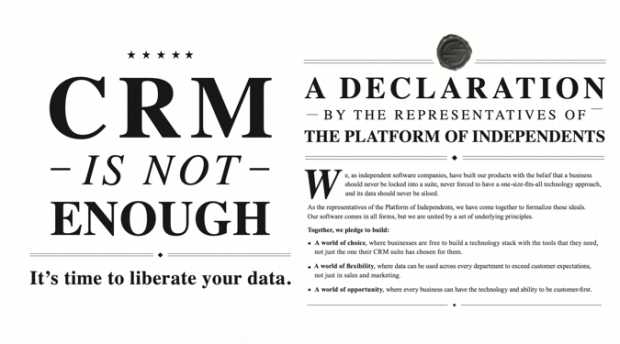Editor’s Note: With anywhere from 4000-7000 (depending on how you slice it) companies vying for a chunk of the Martech space, it was probably only a matter of time until the larger cloud platforms came under fire. Last week marked the first volley in what looks to be more than a minor skirmish with the announcement of an anti-CRM coalition.
The Platform of Independents – led by customer data infrastructure company Segment – has declared a new age of digital customer connection, one without CRM in the centre.
In a letter published in the Wall Street Journal, more than 200 enterprise software company CEOs and leaders have signed on to the declaration that CRM is no longer enough to support sophisticated and seamless customer connection.
By Josh Loh
Led by customer data infrastructure firm Segment, ‘The Platform of Independents’ says its pledge is to liberate data from the limitations of traditional CRM suites and allow businesses to build customized technology stacks that fit their needs.

“CRMs were perfect for the Rolodex era,” writes CEO and cofounder of Segment, Peter Reinhardt. “They are not equipped for today’s digital age, where massive volumes of data flow directly from your websites, mobile apps, emails, kiosks and call centers every single second of every day.
“Your company’s data should be available in your preferred, best-in-class business applications, not just the ones that your CRM suite has chosen for you.”
The group of technology companies is comprised of Segment, Airship, Amplitude, Drift, Iterable, Mixpanel, Outreach, Pendo, Radar and Tray.io, as well as more than 190 co-signatory companies.
The Platform of Independents’ three pledges are to build:
- A world of choice – where businesses are free to build a technology stack with the tools that they need, not just the one their CRM suite has chosen for them.
- A world of flexibility – where data can be used across every department to exceed customer expectations, not just in sales and marketing.
- A world of opportunity – where every business can have the technology and ability to be customer-first.
According to Reinhardt, ‘legacy CRM vendors’ have spent more than $30 billion acquiring new applications and technologies to improve the stagnant functionality of CRMs in modern business.
In 2018 Adobe spent close to $9 billion in acquiring ecommerce platform Magento and marketing automation platform Marketo. Last year Salesforce made its largest acquisition to date (by price), spending AU$22.6 billion on Tableau in an all-stocks transaction.
“But these acquisitions won’t change much,” continues Reinhardt. “The truth of the matter is that CRM suites are no longer the best way to deliver a great customer experience.”
Reinhardt’s letter goes on to explain the credo of the new Platform of Independents group – that the collective vendors’ technologies will be built in the belief that “a business should never be locked into a suite, its data never locked in silos and never forced into a one-size-fits-all technology approach.”
According to CEO and cofounder of Tray.io Rich Waldron, the secret sauce to being customer-first is having an integrated technology stack with the ability to easily automate data between applications, “which is why companies need the deep insights of customer data and the power of automation to scale.”
With the largest CRM providers preparing to introduce their latest updates at their respective showcases – Adobe Summit in March, Hubspot Inbound in August and Salesforce Dreamforce likely in November – it remains to be seen if legacy CRM vendors will sympathise with the movement to prioritise liberating in-house data silos.
Last year, Adobe introduced the Open Data Initiative (ODI) in partnership with Microsoft and SAP. The new data protocol was proposed to solve the industry’s lack of standard data formatting, one that would certainly aid in smoothening internal information silos.
This article was originally published in Marketing. Photo by Andrew Friedrich on Unsplash.













